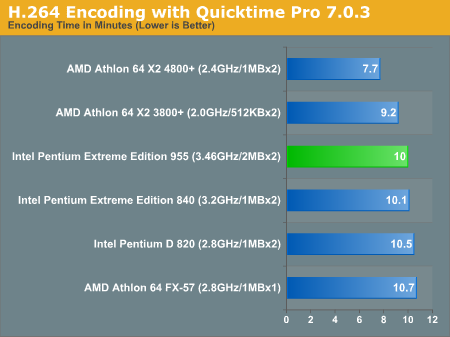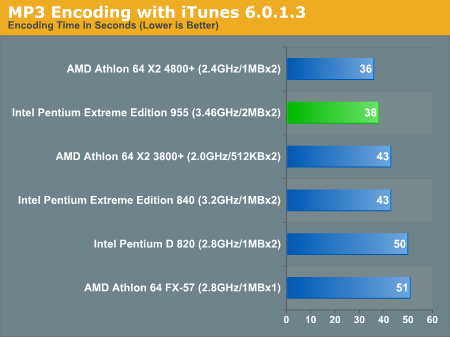Intel's Pentium Extreme Edition 955: 65nm, 4 threads and 376M transistors
by Anand Lal Shimpi on December 30, 2005 11:36 AM EST- Posted in
- CPUs
Media Encoding Performance using DVD Shrink, WME9, Quicktime and iTunes
First up is DVD Shrink 3.2.0.15. Our test was simple - we took a copy of Star Wars Episode VI and ripped the full DVD to the hard drive without compression, effectively giving us an exact copy of the disc on the hard drive. Then, using the copy of the DVD on the hard drive (to eliminate any DVD drive bottlenecks), we performed a DVD shrink operation to shrink the movie to fit on a single 4.5GB DVD disc. All of the options were left on their defaults, so the test ends up being pretty easy to run and reproduce. The scores reported are DVD encoding times in minutes, with lower numbers meaning better performance.
The DVD Shrink test is quite important as DVD Shrink is quite possibly one of the easiest tools to rip a DVD. The easier a tool is to use, the more likely it's going to be used, and arguably, the more important performance using it happens to be.
Moving on, we have our Windows Media Encoder 9 test, which uses the advanced profile settings for video encoding. We left all settings at their defaults and just proceeded with an MPEG-2 to WMV-HD conversion. The values reported are in frames per second, with higher numbers being better.
Next up, we have Quicktime Pro 7.0.3 and we perform a MPEG-2 to H.264 encoding task. All of the settings are left at their defaults, with the exception that we optimize the output file for download with a 256kbps data rate while leaving the resolution untouched. We also adjust the video options to optimize for the best quality. We report the transcoding time in minutes, with lower values being better.
Finally, we have a MP3 encoding test using iTunes 6.0.1.3. For this test, we simply took a 304MB wav file and converted it to a 192kbps MP3 file, measuring the encode time in seconds. The only iTunes option that we changed was to prevent the playback of the song while encoding.
First up is DVD Shrink 3.2.0.15. Our test was simple - we took a copy of Star Wars Episode VI and ripped the full DVD to the hard drive without compression, effectively giving us an exact copy of the disc on the hard drive. Then, using the copy of the DVD on the hard drive (to eliminate any DVD drive bottlenecks), we performed a DVD shrink operation to shrink the movie to fit on a single 4.5GB DVD disc. All of the options were left on their defaults, so the test ends up being pretty easy to run and reproduce. The scores reported are DVD encoding times in minutes, with lower numbers meaning better performance.
The DVD Shrink test is quite important as DVD Shrink is quite possibly one of the easiest tools to rip a DVD. The easier a tool is to use, the more likely it's going to be used, and arguably, the more important performance using it happens to be.

Moving on, we have our Windows Media Encoder 9 test, which uses the advanced profile settings for video encoding. We left all settings at their defaults and just proceeded with an MPEG-2 to WMV-HD conversion. The values reported are in frames per second, with higher numbers being better.

Next up, we have Quicktime Pro 7.0.3 and we perform a MPEG-2 to H.264 encoding task. All of the settings are left at their defaults, with the exception that we optimize the output file for download with a 256kbps data rate while leaving the resolution untouched. We also adjust the video options to optimize for the best quality. We report the transcoding time in minutes, with lower values being better.

Finally, we have a MP3 encoding test using iTunes 6.0.1.3. For this test, we simply took a 304MB wav file and converted it to a 192kbps MP3 file, measuring the encode time in seconds. The only iTunes option that we changed was to prevent the playback of the song while encoding.











84 Comments
View All Comments
Betwon - Saturday, December 31, 2005 - link
NO.Don't You think that Future versions of the patch will be written by intel.
Viditor - Saturday, December 31, 2005 - link
Doubtful (but who knows)...I can't see Intel spending 100s of millions with every developer (or even 1 developer) for the long term, just to keep tweaking their patches. It's just not a very smart long term strategy (and Intel is quite smart).
Betwon - Saturday, December 31, 2005 - link
You just guess it.We find that the good quality codes can provide better performance for both AMD and Intel.
Intel can often benefit more, because the performance potential of Intel is high.
Now, You can not find another SMP-game which can make fps of SMP CPU improve so much great.
If you find it, please tell us.
There is no one who found it.
Viditor - Saturday, December 31, 2005 - link
Now it's you who's guessing...
Betwon - Saturday, December 31, 2005 - link
NO.It is true.
Viditor - Saturday, December 31, 2005 - link
OK...prove it!
Betwon - Saturday, December 31, 2005 - link
For example:we saw a test(from anandtech)
With the good quality codes, AMD become faster than before, but Intel become much faster than before.
They use Intel's compiler.
Betwon - Saturday, December 31, 2005 - link
When not use the intel's compiler, AMD become slow.Viditor - Saturday, December 31, 2005 - link
I know you've often quoted from the spec.org site...
I suggest you revisit there and look at the difference between AMD systems using Intel compilers and the PathScale or Sun compilers. In general, the Spec scores for AMD improve by as much as 30% when not using an Intel compiler...especially in FP.
http://www.swallowtail.org/naughty-intel.html">http://www.swallowtail.org/naughty-intel.html
defter - Saturday, December 31, 2005 - link
This is not true, for example:
FX-57, Intel compiler, SpecInt base 1862:
http://www.spec.org/osg/cpu2000/results/res2005q2/...">http://www.spec.org/osg/cpu2000/results/res2005q2/...
FX-57, Pathscale compiler, 1745: http://www.spec.org/osg/cpu2000/results/res2005q2/...">http://www.spec.org/osg/cpu2000/results/res2005q2/...
Opteron 2.8GHz, Intel compiler, SpecInt base 1837: http://www.spec.org/osg/cpu2000/results/res2005q3/...">http://www.spec.org/osg/cpu2000/results/res2005q3/...
Opteron 2.8GHz, Sun compiler, SpecInt base 1660: http://www.spec.org/osg/cpu2000/results/res2005q4/...">http://www.spec.org/osg/cpu2000/results/res2005q4/...
In SpecFP Intel compiler produces slightly slower results, but the difference isn't 30%:
Opteron 2.8GHz (HP hardware), Intel compiler, SpecFP base 1805: http://www.spec.org/osg/cpu2000/results/res2005q3/...">http://www.spec.org/osg/cpu2000/results/res2005q3/...
Opteron 2.8GHz (HP hardware), Pathscale compiler, SpecFP base 2052: http://www.spec.org/osg/cpu2000/results/res2005q3/...">http://www.spec.org/osg/cpu2000/results/res2005q3/...
Opteron 2.8GHz (Sun hardware), Sun compiler, SpecFP base 2132: http://www.spec.org/osg/cpu2000/results/res2005q4/...">http://www.spec.org/osg/cpu2000/results/res2005q4/...
So let's see:
Intel vs Sun compiler:
- Intel complier is 10.7% faster in SpecINT
- Sun compiler is 18.1% faster in SpecFP
Intel vs Pathscale compiler:
- Intel compiler is 6.7% faster in SpecInt
- Pathscale compiler is 13.7% faster is SpecFP
It is quite suprising that Intel's compiler gives best results for AMD's processors in many situations.